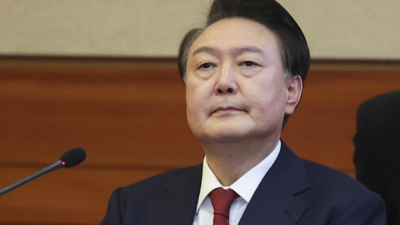SEOUL: South Korea’s impeached president Yoon Suk Yeol denied on Tuesday that he instructed the military to remove lawmakers from the National Assembly to prevent them from voting to reject his martial law decree last month. He made this statement during his first appearance before the Constitutional Court, which will decide his fate.
This marked the impeached president’s first public appearance since becoming South Korea’s first sitting president to be detained following his short-lived declaration of martial law, which sparked political upheaval in the country.
After he imposed martial law on December 3, he sent troops and police officers to surround the National Assembly. However, enough lawmakers managed to enter and unanimously vote to reject the decree, forcing Yoon’s Cabinet to revoke the measure early the next morning.
Yoon, a conservative, argued that the dispatch of troops was not intended to block the assembly but to warn the main liberal opposition Democratic Party. He claims that the party has used its legislature majority to obstruct Yoon’s agenda, derail his budget bill, and impeach top officials. In declaring martial law, Yoon said that the assembly was “a den of criminals” hindering governance and vowed to eliminate “shameless North Korea followers and anti-state forces.”
The commanders of the military deployed to the assembly have disagreed with Yoon’s position. Commander of the special forces unit, Kwak Jong-keun, told an assembly that Yoon had contacted him, ordering his troops to “quickly destroy the door and drag out the lawmakers who are inside.” Kwak said that he did not follow through with the order.
When asked by acting Constitutional Court chief justice Moon Hyungbae if he had ordered the lawmakers to remove the lawmakers, Yoon replied that he didn’t do so.
Yoon said the lawmakers could have convened elsewhere to overturn the decree. He also said that attempting to physically block an assembly vote would have caused a popular backlash.
“If I had obstructed (the vote), I think I wouldn’t have been able to handle the consequences,” Yoon said.
When asked by Moon about reports that he had given a memo to a top official regarding the establishment of an emergency legislative body before imposing martial law, Yoon denied it. Whether Yoon plotted to create such a body would help shed light on his true intentions for declaring martial law.
On December 14, the assembly impeached Yoon, suspending his presidential powers. The constitutional court has until June to decide whether to formally dismiss him as president or reinstate him. However, observers expect a ruling to be issued sooner.
Separately, law enforcement authorities are investigating whether Yoon and others committed crimes such as rebellion and abuse of power about the martial law decree. Under the law, the leader of a rebellion could face life imprisonment or the death penalty.
Yoon initially ignored several requests to appear for questioning and remained in his presidential residence in Seoul, even though his defense minister, police chief, and several top military commanders had already been arrested for their roles in enforcing martial law. On January 15, he was eventually detained when authorities deployed hundreds of police and investigators near his residence.
While South Korean presidents enjoy broad immunity from prosecution while in office, it does not extend to charges of rebellion or treason.
Yoon’s martial law decree has shaken South Korea’s diplomatic activities and financial markets and tarnished its image as a vibrant democracy. The impeached president’s defiance coupled with the opposition’s efforts to remove him have further intensified the country’s already-serious internal divide.
After a Seoul district court approved a formal arrest warrant on Sunday to extend Yoon’s detainment, dozens of his supporters stormed the court causing extensive damage to windows, doors, and other property. They also attacked police officers with bricks, steel pipes, and other objects, injuring 17 officers. Police detained 46 protesters in connection with the violence.




